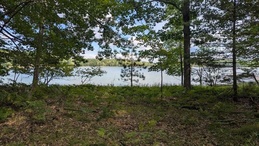What's Up with that Fracking Well Next Door?
Neighbors worry what fracking will do to their property values
Nov. 11, 2012

What used to be quiet, pastoral farmland -- a rural setting nestled on a plateau just up the road from the Rapid River, not far from historic Rugg Pond -- has been invaded by heavy equipment.
In August, bulldozers and graders and dump trucks rumbled along Wood Road to a parcel that used to be part woods and part meadow. To the utter surprise of most neighbors, workers started construction of a deep-shale, horizontal fracturing natural gas well at the site, located in Kalkaska County’s Rapid River Township. As trees were felled and ground was turned over and wildlife was displaced, neighbors worried.
"That area up there was always a really beautiful wildlife area," said Phyllis Senske, a neighbor whose family has owned land in the area for 100 years.
But the worry was about more than wildlife -- residents also fear what drilling means for property values.
"All of us have lost our peace and our quiet and our rural atmosphere, and we haven’t had anything to say about it," Senske said.
NEIGHBORS HAVE NO SAY
This isn’t the first time a controversial fracking well has appeared in the region. There are two others on state land on Excelsior and Oliver townships in southern Kalkaska County.
But this is the first time in the area that a well like this has appeared so close to houses.
As companies enter the region looking to tap the Utica-Collingwood shale for natural gas deep below the surface, it’s likely more rural Northern Michigan residents will wake up to the appearance of a horizontal fracking operation near their houses.
Neighbors do not have any recourse when mineral rights are sold and a company comes in to drill for natural gas, as long as the company follows state law and the operation is properly permitted, said Rick Henderson of the Department Of Environmental Quality Oil, Gas and Minerals division.
Henderson said if neighbors are upset over a well, they could try going to court.
Susan Hlywa Topp, a Gaylord attorney who specializes in oil and gas, said neighbors of drilling operations only have a case if operations are excessive.
Henderson said a well head must be 300 feet from the nearest drinking water well. Wells within a quarter mile are monitored with test wells to make sure a drilling operation doesn’t deplete the aquifer and threaten an area’s drinking water supply, though wells are not tested for contamination.
Indeed, the DEQ’s position is that horizontal, deep-shale hydraulic fracturing is safe, and does not pose a threat to human health through drinking water or other pollution if it is carried out within the rules and is properly regulated.
Henderson said that after initial construction activity on a well and after fracturing has taken place, neighbors can expect noise and truck traffic to cut off significantly.
Messages left with Chevron were not returned.
"˜I WANT JOBS’
Opponents of horizontal fracking say the practice is dangerous, the chemicals used to break up rock deep underground pose a threat to drinking water and human health, and that the process uses way too much fresh water.
The people closest to the Wood Road well are not anti-fracking activists, however.
Those interviewed by the Express said they are not opposed to fracking in general.
Ruth Crawford, whose property is adjacent to the well, said she supports natural gas drilling.
"I want jobs and I want to be independent of other countries," Crawford said. "I’m not trying to fight this or anything, I mean, it’s just something we have to live with."
Yet Crawford fears for the safety of her drinking water. She estimates her drinking water well is less than 1,000 feet from the Chevron well head.
Crawford just had her water tested so she can compare it to what comes out of her well after the operation is up and running.
"There’s not one bad thing in that water, not one ounce of anything that’s bad," Crawford said. "This is perfect water. This is an important piece of paper."
VALUE TAKEN WITHOUT COMPENSATION
Crawford and other neighbors also said they are frustrated that neighbors had no warning this was coming and they had no opportunity to voice opposition or raise questions.
They said they don’t understand how neighbors have no say over something that changes the character of the place they live and could decrease property values.
The Crawfords, the Senskes and others cite anecdotal evidence and common sense as proof their property values will decline as a result of the well.
A Duke University research paper released in September concluded that while shale gas development may have a positive impact on a region as a whole, "negative externalities associated with the process may adversely affect the prices of nearby homes."
The study, which looked at property values near natural gas drilling operations in Pennsylvania, a state that has experienced widespread hydraulic fracturing for several years, found that natural gas drilling caused most pronounced property value decline when it occurred in areas where homeowners tapped groundwater for drinking water.
Crawford said she raised her concerns about property value to a Chevron executive.
"He said "˜that’s silly,’" she said. "He said: "˜Don’t worry about it, it won’t effect your property value at all.’ I don’t believe it."
THOUSAND-ACRE FARM
To believe that property values won’t be affected defies what’s obvious, Crawford and Senske say.
Senske was born in the house where she now lives. Her grandparents settled there in 1902 and her family raised Herferd beef cattle and logged throughout the area.
Her family once owned the whole area -- 1,000 acres. It’s been sold off here and there in bits and pieces, including the land where the gas well is being put in now.
"It’s always been pretty peaceful and quiet, the neighbors have always been peaceful and cooperative," she said.
What the Senskes have left is 40 acres they might want to sell soon because of their age, Senske said, and they don’t believe they could get as much for their farm as they could have gotten before the drilling began.
Last year, the Crawfords completed an addition which cost tens of thousands of dollars. They added a sun room with a large glass wall. That large glass picture window once faced a farm field and woods. Now it faces an industrial natural gas drilling operation.
"That room happened to be all glass and now I have to look at an oil well," Crawford said.
When someone recently contacted Crawford about some nearby acreage she had listed for sale, Crawford said the potential buyer learned of the drilling operation and quickly lost interest.
"These people turned around immediately," Crawford said. "They said, "˜We would not by your house on a bet."
Richard Westerman, a former Kalkaska attorney who owns three quarters of the mineral rights and leased them to an intermediary who leased them to Chevron, said he never envisioned anything happening to the land when he bought 400 acres in the 1970s.
"It stands to be a boon for my family, but it’s nothing you plan," Westerman said. "It’s unfortunate that people are impacted negatively. I feel bad about it."

NOISE, DUST, AND A RUMBLING EARTH
Beyond concern about property values and the quality of drinking water, the fracking project has disrupted life in the neighborhood in other ways.
Crawford is worried the enormous amount of water used in a fracking operation could draw down the aquifer where she gets her drinking water.
"If we turn on the water faucet and no water comes out, we’re going to know our water is gone," she said.
The operation has also caused disturbances in the past couple of months.
The quiet road has experienced noisy, heavy truck traffic like never before.
There is noise from well pad construction that they never had to endure previously, and the industrial noise has lately begun as early as 7 a.m.
The Senskes watched a farm field across from their home turn into a large-scale sand and gravel pit to service the well construction.
Senske said it was horrible this summer when it was dry and dust would blow across the road.
"When I have sand on the keys of my piano and when I have sand on my books, two things I love very much, then I’m not a happy camper," she said.
And as the operation ramped up, Crawford and Senske said well construction caused them to feel their homes rumble.
"Our house was shaking last week and they haven’t even started drilling," Crawford said.
Trending

Farm to Glass with Ethanology
When Elk Rapids distillery Ethanology committed to locally-sourced ingredients for their products, it seemed like they&rsquo… Read More >>
MRKT HLDY SHPPNG, aka Warehouse MRKT Holiday Shopping!
Shop the latest from local makers and vendors at the Holiday MRKT Share at Warehouse MRKT in TC, Saturday, Dec. 20, from 10a… Read More >>
Men and Ugly Sweaters
Those two things don’t always go together, but on Dec. 19, you’ll see both out and about in Petoskey and Harbor … Read More >>


